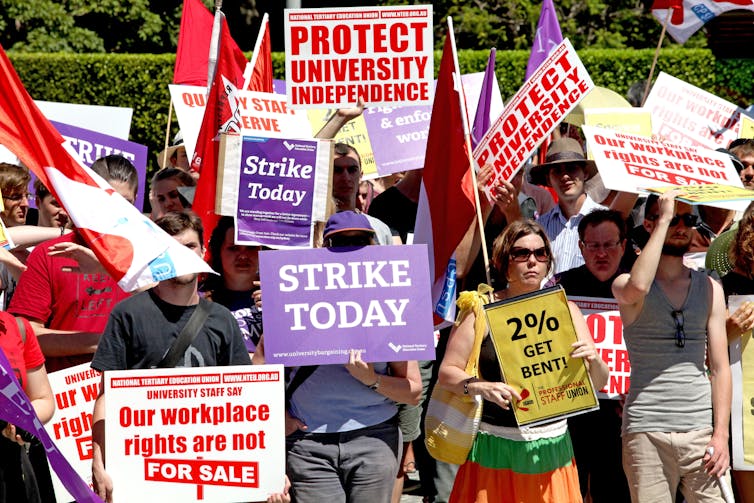Unis are run like corporations but their leaders are less accountable. Here's an easy way to fix that
- Written by Luke Beck, Associate Professor of Constitutional Law, Monash University
A common critique of Australian universities today is that they operate as if they are corporations. The pursuit of endless sales in the form of international student enrolments appears to be their principal purpose, rather than the pursuit of learning and knowledge.
The government seems to view universities the same way it views big business. Prime Minister Scott Morrison recently justified not extending JobKeeper to universities by saying:
[…] these are very large organisations with billion-dollar reserves and they’ve got multi-million-dollar CEOs and they’re making decisions about how they’re running their own organisations, just like many large businesses are going through this.
But there are lots of important differences between universities and big businesses. The difference I want to highlight is accountability. In some respects, there is more accountability in big businesses than in universities. Universities should be made more accountable to their members.
Read more: Governing universities: tertiary experience no longer required
The corporate analogy
 The vice chancellors of Australian public universities are paid an average of nearly $1 million a year.
Dan Himbrechts/AAP
The vice chancellors of Australian public universities are paid an average of nearly $1 million a year.
Dan Himbrechts/AAP
Vice-chancellors might get paid like corporate CEOs – as much as A$1.6 million, with an average of nearly A$1 million for Australia’s 37 public universities. However, university governance and VC remuneration decisions are less accountable than corporate governance and CEO remuneration decisions. This should change.
The analogy with corporations makes a little bit of sense. Vice-chancellors are kind of like company chief executive officers: both are the most senior executive officer responsible for running the organisation. And university councils are kind of like company boards of directors: they both have ultimate oversight of the organisation and are responsible for appointing the VC/CEO.
But the analogy largely stops there. Universities might operate like corporations, but they are not accountable like corporations.
Governance accountability
Shareholders, who are “members” of the company, elect a company’s board of directors. By contrast, the “members” of the university do not choose university councils.
The statutes establishing universities say the staff and students of the university are “members” of the university. But university members don’t get to choose most members of university councils. Staff and students elect only a small number of university council representatives. Governments or the councils themselves appoint most members.
This should change. At the very least, appointed university council members should be liable to be removed by a special majority vote of university members.
Remuneration accountability
Just like company boards of directors determine CEO pay, university councils determine VC pay.
CEO pay decisions made by company boards of directors are accountable to company members. The law imposes a “two strikes” rule. If 25% or more of shareholders vote against a company’s remuneration report two years in a row, then a vote on whether to spill the board must take place.
By contrast, university members have no say over VC pay. University councils are not accountable to university members in the same way company boards are accountable to company members.
This should change. A similar “two strikes” rule should apply to universities.
University councils should submit annual remuneration reports covering the highest-paid university executives to university members. If 25% or more of university members vote against the remuneration report two years in a row, then there should be a spill of the university council. Following a spill, appointed members should be subject to strict criteria governing whether they can be reappointed.
 When academics and students are unhappy with university decision-making they have less power to change things than stakeholders in a company.
Damian Shaw/AAP
When academics and students are unhappy with university decision-making they have less power to change things than stakeholders in a company.
Damian Shaw/AAP
Read more: University councils need greater expertise, including staff and student voices
The right kind of corporatisation
To be sure, these kinds of improved accountability measures can’t fix all of the woes of the university sector. Underfunding the education of Australian students and underfunding research are fundamental problems and need to be fixed.
But university accountability is still important. And it would cost the taxpayer nothing to do something about it: just a tweak to legislation, no spending needed.
Ironically, a bit more of the right kind of corporatisation might help remedy the worst aspects of the current model of corporatised universities.
There is no good reason why there should be more accountability and democracy in a private company than in a public university.
Read more: Universities and government need to rethink their relationship with each other before it's too late
Authors: Luke Beck, Associate Professor of Constitutional Law, Monash University





